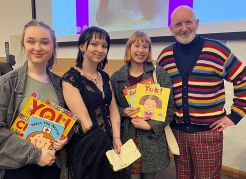12 March 2007
Seeing Science is believing
MMU's super microscope

A SUPER-microscope system capable of enlarging images one million times is helping scientists push forward the boundaries of knowledge in renewable energies, environmental materials, mobile technologies and other scientific projects.
The £1million analytical Scanning Electron Microscope (SEM), the first in the UK with a SEM-based micro-Raman analysis system, has been installed in the Faculty of Science and Engineering to underpin research in materials, biology, forensics and environmental science.
The machine allows for the multi-technique study of materials on a nanometre scale so that images can be enlarged one million times to resolve features only a few nanometres in size.
Working with industry
Scientists and engineering in MMU’s Dalton Research Institute are already planning to expand their work with industry and research groups on the identification of very small particles. Collaborations are already underway with Pilkington’s Glass, CIBA Pharmaceuticals, Millennium Chemicals and other leading companies.
Research with Pilkington’s into surface coatings, for example, has led to advances in heat retaining glass which is contributing to lower building and heating costs. The new microscope will give MMU and Pilkington researchers much more information about what is occurring on a surface in a given process.
Senior Research Fellow Dr Vladimir Vishnyakov, whose work includes analysing materials for solar and fuel cells, said: "The evolution of technology relies on nano analysis which affects much topical research into renewable energy sources, the next generation of mobile devices and analysis of environmental pollution."
Services to industry
Costing almost £1 million and funded by the Science Research Investment Fund and MMU, the facility will be used for cross-faculty research projects in aviation pollution analysis, cancer research and surface coatings.
Dean of Faculty Professor Maureen Neal says: "The equipment is intended to be self-sustainable through funded research and by providing a full analytical service to external companies, and part of the income generated will keep the equipment up-to-date."


